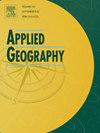分析大流行后人口回流模式的中断:中国城市的网络视角
IF 4
2区 地球科学
Q1 GEOGRAPHY
引用次数: 0
摘要
COVID-19 大流行从根本上重塑了全球社会经济结构,引发了人们生活方式的深刻变革。深入分析疫情后人口回流模式的混乱和不断变化的驱动因素,有助于社会经济的恢复、发展和宏观调控。本文运用社会网络分析方法,研究了大流行期间中国主要城市节后人口回流过程中人口流动网络(PMN)的空间模式和城市区位属性的演变,评估了不同的邻近性对人口流动网络的影响。结果表明(1)疫情期间,中国人口流动的地理格局发生了显著波动,具有明显的区域性和时间性差异,而城市间的联系则越来越多地转向短途旅行。(2)从 2019 年到 2022 年,中国主要城市的地位和连通性发生了显著变化,在全国人口流动网络中演变为多中心结构。(3)社区集群主要遵循省域划分,尽管区域内竞争激烈,但主要城市群内部结构保持稳定,南北地区社区稳定性差异明显。(4)除了传统的社会经济因素外,数字金融水平已成为人口流动的新动力,城市间关系的不同属性也对 PMN 产生了显著影响。从人口流动的角度研究空间模式和城市位置,可以为疫情后国家资源分配和城市恢复战略的优化提供参考。本文章由计算机程序翻译,如有差异,请以英文原文为准。
Analyzing disruptions in post-pandemic population return patterns: A network perspective on Chinese cities
The COVID-19 pandemic has fundamentally reshaped global socio-economic structures, precipitating a profound transformation in people's lifestyles. An in-depth analysis of the disruptions in post-pandemic population returns patterns and the evolving driving factors can facilitate socio-economic recovery, development, and macro-control. This paper employs social network analysis to examine the spatial patterns and evolving urban locational attributes of the Population Mobility Network (PMN) during post-holiday returns in major Chinese cities amid the pandemic, assessing the impact of varying proximities on the PMN. The results indicate that: (1) During the pandemic, the geographic patterns of population mobility in China underwent significant fluctuations, with distinct regional and temporal variations, while intercity connections increasingly shifted toward shorter trips. (2) From 2019 to 2022, major Chinese cities experienced notable changes in status and connectivity, evolving into a multi-centric structure within the national population mobility network. (3) Community clusters predominantly adhere to provincial demarcations, maintaining stable structures within major urban agglomerations despite intense intra-regional competition, with clear distinctions in community stability between northern and southern regions. (4) Beyond traditional socio-economic factors, the level of digital finance has emerged as a new driver of population mobility, with the varied attributes of inter-city relationships also significantly influencing the PMN. Studying spatial patterns and urban location from the perspective of population mobility can inform post-pandemic optimization of national resource allocation and urban recovery strategies.
求助全文
通过发布文献求助,成功后即可免费获取论文全文。
去求助
来源期刊

Applied Geography
GEOGRAPHY-
CiteScore
8.00
自引率
2.00%
发文量
134
期刊介绍:
Applied Geography is a journal devoted to the publication of research which utilizes geographic approaches (human, physical, nature-society and GIScience) to resolve human problems that have a spatial dimension. These problems may be related to the assessment, management and allocation of the world physical and/or human resources. The underlying rationale of the journal is that only through a clear understanding of the relevant societal, physical, and coupled natural-humans systems can we resolve such problems. Papers are invited on any theme involving the application of geographical theory and methodology in the resolution of human problems.
 求助内容:
求助内容: 应助结果提醒方式:
应助结果提醒方式:


